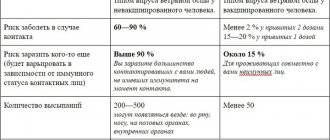What is vaccine and vaccination?
Vaccination is the process of introducing special drugs into the body, which include neutralized viruses and bacteria. They are called antigens. Once entering the body, antigens are quickly recognized by the immune system, which begins to produce antibodies in response to their presence. These antibodies create a reliable “shield”, thanks to which wild strains of viruses and bacteria cannot cause significant harm to the body.
There is a national vaccination calendar approved by the Russian Ministry of Health. It covers all stages of vaccination and revaccination for both adults and children, starting from birth. This calendar is constantly updated with new vaccines.
According to the vaccination calendar, it is recommended that the child be vaccinated against hepatitis B on the first day after birth. On the fourth day of life, BCG-M vaccination is carried out.
When the baby is one month old, he is given a second vaccination against hepatitis B. At the age of two months, the baby is vaccinated against pneumococcus and rotavirus infection.
At the age of three months, vaccinations against diphtheria, whooping cough, tetanus, polio and Haemophilus influenzae are recommended. All these are three-time vaccinations with subsequent revaccinations.
When your baby turns 12 months old, he is given the measles, rubella and mumps vaccine. The vaccination plan also includes vaccinations against papillomavirus and chickenpox. If parents plan to send their child to kindergarten or he attends public events, he is vaccinated against meningococcal infection and hepatitis A. These vaccines are also administered to children living in unfavorable epidemiological conditions.
Vaccines that are administered under adverse environmental conditions also include tick-borne encephalitis and yellow fever. There are seasonal vaccines, for example against influenza. Some vaccines are designed for emergency use. These include the rabies vaccine, which must be administered within 24 hours after an animal bite. There is also a Mantoux reaction. This vaccine is given annually to prevent the risk of contracting tuberculosis.
If the task of vaccines is to create immunity, then revaccinations are designed to maintain it at the required level. Vaccinations that require revaccination include whooping cough, tetanus, measles, mumps, rubella and diphtheria.
Vaccinations: where is the truth and where is the lie?
The work of the human immune system is complex, and failures can have serious consequences. Therefore, many myths and misconceptions arise around vaccinations. Ulyana Vladimirovna Chemova, an immunologist from the “Expert Clinic” in Smolensk, will help us separate facts from fiction.
— Ulyana Vladimirovna, please tell us about the effect of vaccinations.
“This is a complex process, but it is quite possible to explain it in general terms. When neutralized (killed or weakened) microorganisms enter the body, lymphocytes are activated. Immunoglobulins are produced to fight the antigen. Both antibodies and plasma lymphocytes - memory cells - are produced. And if a person has to encounter the same pathogens again, but no longer weakened, thanks to memory cells, the immune response will be stronger and faster. Most likely, the person will not get sick at all. If he gets sick, the disease will be much easier, and the risk of complications in vaccinated people is lower.
— There is an idea that natural immunity is able to resist any infections, and vaccinations weaken it. Are vaccinations really harmful to the immune system?
— There are two types of immunity: innate and adaptive. The innate begins to act immediately when the child is born. It does not have specificity: the body reacts equally to all microorganisms with which it interacts. This type of immunity is genetic and cannot be influenced.
The last case of smallpox in Europe was recorded in 1978.
Then adaptive immunity kicks in. It is formed throughout life and depends on what microorganisms a person encounters. Adaptive immunity is specific. Vaccinations do not weaken, but train it: contact with neutralized microorganisms helps to form immunity before the immediate threat of disease.
Rotavirus infection is especially severe in children and leads to dehydration
Epidemics of the past, which claimed many lives, are a striking example of the fact that without training with the help of vaccinations, the immune system cannot always cope with the threat. Now many diseases are forgotten. Thus, the last case of smallpox in Europe was registered in 1978. The incidence of mumps has decreased by 99%, diphtheria and polio have been almost eradicated.
— What vaccines are currently included in the national vaccination calendar?
— Until 2021, the calendar included 10 vaccinations. These are primary vaccinations and revaccinations against hepatitis B, tuberculosis, pneumococcal infection, polio, complex vaccines DPT (for whooping cough, diphtheria and tetanus) and MMR (for measles, rubella and mumps). After 2021, vaccinations against hemophilus influenzae, pneumococcal infection, and influenza virus were added to the national calendar.
— What are the dates in this calendar based on?
— At the dawn of the vaccine era, scientists had little data, so there was no talk of drawing up a schedule. But with the development of medicine, it was possible to collect data on at what time a person is especially vulnerable to various infections, when the first contact with pathogens in the natural environment occurs, how long immunity is formed after a particular vaccination, and how long cells retain the memory of the specificity of the antigen. This made it possible to determine the optimal timing for vaccination and revaccination and draw up a schedule.
In 2011, almost all US states did not provide the required number of whooping cough vaccinations. As a result, 42 thousand people fell ill the next year. Quote from the material “Who invented vaccinations?”
— What consequences can you encounter if children are not vaccinated according to schedule?
— If you deviate from the schedule, a person may find himself defenseless against dangerous diseases precisely at a time when protection is especially necessary. This increases the likelihood of illness and threatens severe illness and complications.
— Some people do all the vaccinations according to the schedule, and in addition to them there are also a number of vaccinations that are not included in the schedule. Does this make sense?
— Usually, responsible, educated parents, who are accustomed to delving into everything themselves and analyzing information, think about additional vaccinations. Vaccinations against rotavirus, hepatitis A, and chickenpox are in demand. Of course, this makes sense.
How does rotavirus infection occur? Find out here
Rotavirus infection is especially severe in children, leading to dehydration, often leading to intensive care. Children between one and five years of age are often affected. The Rotatek vaccine is administered orally and is administered three times to children under one year of age. Thus, by the time the child comes into contact with the virus in the natural environment, he is already protected.
The Belgian vaccine "Havrix" and the French "Avaxim" allow you to protect against the hepatitis A virus. Hepatitis A is curable, but can lead to complications such as cholangitis and liver failure. It's better to protect yourself in advance.
— Please tell us about herd immunity?
— Collective (population) immunity is a decrease in the viral load on the population as a whole due to a large number of people who have been ill (and survivors of the disease) or vaccination. An immune layer is formed, as a result of which people who do not have specific immunity to a particular disease also do not fall into the risk zone. To protect society from whooping cough, the immune layer must be at least 80% of the population. To prevent hepatitis B, it is necessary to create specific immunity in at least 90% of the population.
— Who are vaccinations really contraindicated for? What protection can these people hope for?
— There are people with immunodeficiency. They cannot form a specific response even after vaccination. Any pathogenic microorganisms, even in weakened live vaccines, are dangerous in case of immunodeficiency. Contact with viruses and bacteria in the natural environment is often fatal for a patient with immunodeficiency. The causes of immunodeficiency are different: congenital disorders, therapy for cancer and transplantation, a number of infectious and non-infectious pathologies.
It is possible to protect these people. The higher the herd immunity, the lower the risk of encountering pathogens. Thus, a person who has no contraindications primarily protects himself with vaccination, but also helps people who are unable to form an immune response to survive.
— What misconceptions about vaccinations have you, as a doctor, encountered among patients?
— There are two categories of patients. The first includes people who refuse vaccinations for religious, ideological and other irrational reasons. Their main argument: “This is foreign, this should not be in the body.” Such patients do not think about specific harm or benefit. It's difficult to convince them.
No link between autism and autism spectrum disorders and vaccines has been found
The second category includes people who are afraid of this or that harm, having read something frightening on anti-vaccination sites. If such people are provided with reliable information and explained how things really are, they usually give up their delusions.
— Among the myths about vaccinations, a popular version is the connection between vaccinations and autism. Please comment.
— The British doctor Andrew Wakefield first spoke about such a connection in the mid-90s. XX century. However, it turned out that the doctor did not conduct reliable research. Moreover, he had a commercial interest in making the public wary of current vaccines: he tried to promote his drug.
But, since the theory had already been put forward, large-scale research began to be carried out. No connection between autism and autism spectrum disorders and vaccinations has been found. The version about the role of thiomerethiolates (preservatives for vaccinations) in the occurrence of such conditions was not confirmed either.
Autism is not one of the possible complications from vaccinations.
— What complications can vaccinations really cause?
— First of all, it is worth distinguishing between the terms “complication” and “reaction.” A reaction to a vaccine is normal. While the immune response is being formed, the patient may experience a change in the emotional background (irritability, etc.), a temporary deterioration in health, fatigue, and a rise in temperature. Moreover, during a normal reaction, the temperature never rises above 40°. Rashes may occur with measles and rubella vaccinations. The reaction differs from complications in that it is short-term and does not pose a threat to life and health.
The empress herself set an example: the vaccination campaign began on October 12, 1768. Quote from the material “Catherine the Great: healthcare organizer, pediatrician and teacher”
Temperatures above 40° are considered a complication and are rare. Complications include an overly pronounced local reaction: hyperemia, papule more than 10 centimeters, convulsions, high temperature for more than 2 days. A complication may result from an incorrect interpretation of the child’s condition before vaccination (if the vaccine is administered to an already ill child in the prodromal period).
Complications occur in one case per several hundred or thousand vaccinations. Each case is studied in detail and the reasons are determined. Diseases in unvaccinated people are a much more frequent and dangerous phenomenon.
— How to behave correctly after vaccination?
— You should remain near the treatment room for 40 minutes. There are anti-shock medications in the office, so if anaphylactic shock occurs, help will be provided immediately. On the first day, do not wet the injection site to avoid infection. Also, do not sunbathe, overheat, or allow other overloads. You cannot change the climate suddenly: such a load may be excessive for the body. It is necessary to ensure that vaccination is not combined with the introduction of new foods into the diet or taking previously unused medications. Otherwise, if an allergic reaction occurs, it will be impossible to understand what caused it.
After oral vaccines, you should avoid eating for two hours.
It is advisable to keep in touch with your doctor and report the appearance of certain symptoms.
— Do adults need to be vaccinated?
- Necessary. The DTP vaccine requires revaccination every 7 to 9 years. If a woman missed a rubella vaccine as a child, it is advisable to get vaccinated before the onset of her reproductive period (according to clinical recommendations, up to 25 years). Rubella is scary not so much for adults as for the fetus during its formation. Vaccination against measles is carried out up to 35 years of age, but for people at risk up to 55 years of age. There are other indications (travel to other regions, etc.) about which the doctor will warn you.
Interviewed by Daria Ushkova
The editors recommend:
Your immune system is under control! We create a strong rear for the child
Children's lies. Let's understand the reasons
Are unvaccinated children the healthiest?
For reference:
Chemova Ulyana Vladimirovna
In 2006 she graduated from the Smolensk State Medical Academy
In 2006-2007, she completed an internship in the specialty "Pediatrics"
In 2013 – primary retraining in the specialty “Allergology and Immunology”
Since December 2021, he has been working as a pediatrician and allergist-immunologist at Clinic Expert Smolensk LLC.
What are the benefits of vaccinations?
Epidemics and dangerous diseases have always accompanied humanity. Some of them claimed millions of lives. Thanks to the creation of vaccines, it was possible to completely eradicate a disease such as smallpox. Outbreaks of anthrax, polio and diphtheria are much less common. Vaccines have made diseases manageable.
Mass vaccination of children and adults contributes to the development of collective immunity. This stops the process of transmission of infection from infected people to healthy people. Since those vaccinated have antibodies, they do not become infected and the disease gradually subsides, stopping its spread.
Vaccines help humanity. With their help, it was possible to reduce the mortality rate, they prevent disability in case of infection, and help fight the most dangerous diseases.
Mantoux test value
The Mantoux test in Russia is carried out for all children and adolescents. Almost every adult is infected with the tuberculosis bacillus; the reaction in almost 100% of cases indicates the presence of the disease. In this case, the degree is important. If the indicator is average, the person is safe. If the indicator is high, this is a bad signal. Today, there are 80 cases of the disease per 100 thousand population, but thanks to the Mantoux test it can be detected at an early stage.
Water is an irritant that will increase the reaction to the vaccine and it may be mistakenly identified as positive. In this case, additional samples will be needed. Therefore, there is no need to wash, swim or steam in a bathhouse, nor do you need to scratch, warm or rub the injection site.
Vaccination of children and adolescents is carried out free of charge. The cost of a Mantoux test for adults in Moscow varies from 800 to 3380 rubles. In any case, the vaccine itself costs much less than treatment and care for the patient.
Article on the topic
Mantoux test or Diaskintest. How to more accurately identify tuberculosis?
Also, in a medical institution, a person will be able to receive complete information about vaccinations, the consequences of refusing them and possible consequences. A person also has the right to free vaccinations included in the national calendar of preventive vaccinations and the vaccination calendar for epidemic indications, and to a medical examination before vaccinations, and to receive medical care in case of post-vaccination complications.
Can the vaccine cause harm?
The composition of the vaccine is strictly regulated. However, the vaccine causes a number of reactions in some people. They are divided into acceptable and undesirable. Acceptable reactions are related to the functioning of the immune system. These include:
- increased body temperature;
- moderate malaise;
- lethargy;
- moodiness;
- a feeling of pain and swelling at the injection site.
These symptoms go away on their own over a short period of time. Medical assistance is not required.
Adverse reactions most often occur in people with hypersensitivity, individual intolerance or immune disorders. In this case, a variety of allergic reactions, including anaphylactic shock, may occur.
To avoid unwanted reactions, a person must undergo a comprehensive examination before vaccination. After administering the drug, the patient should also be under the supervision of medical personnel for half an hour. If a child is at risk or has contraindications, an individual vaccination schedule is developed for him.
With the right and responsible approach, unwanted reactions occur extremely rarely.
How vaccines work
Vaccines contain weakened or inactive parts of the pathogen (antigens). Modern vaccines use predominantly synthetic (artificially created) antigens. Without containing a full-fledged live pathogen, vaccines cannot cause the disease itself, but they trigger the production of specific antibodies in the same way as the pathogen itself would do. The immune system will react in the same way as if it were initial contact with a real pathogen.
To obtain a sustained immune response, a vaccination schedule with multiple doses administered at long intervals (several weeks or months) is often used. This pattern is necessary for the production of long-lived antibodies and the development of memory cells. The body accumulates a memory of the pathogen so that if it comes into contact with it in the future, it will be able to immediately fight and destroy it.
Refusal to vaccinate: possible consequences
It is necessary to understand that vaccination is the right of every person, but not an obligation. You yourself make the decision about the need for certain vaccinations.
Refusal to vaccinate will deprive your child of needed protection. As a result, the risk of contracting dangerous infections increases. Massive refusal to vaccinate can lead to epidemics and increased mortality from disease.
Routine vaccination was created specifically to protect the population by creating artificial immunity. This is the only way to protect yourself from diseases that, thanks to vaccinations, are a thing of the past.








